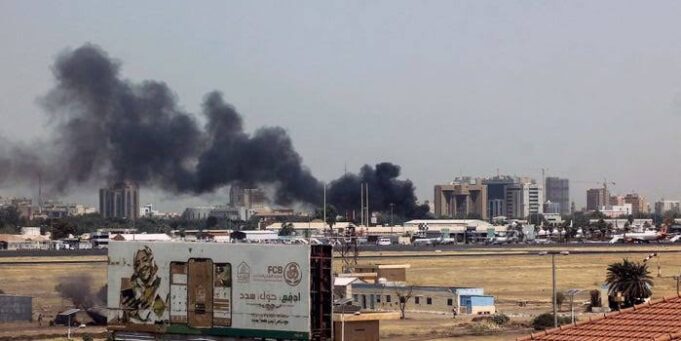The Federal Government (FG) has declared that it is difficult to evacuate Nigerians stranded in Sudan over the crisis in the country.
The FG said the tensed situation in Sudan makes it risky and impossible to evacuate stranded Nigerians from the country, noting that aircrafts parked at the airport in the nation were burnt.
The Chairman/Chief Executive Officer, Nigerians in Diaspora Commission, Abike Dabiri-Erewa, said this via a statement issued on Friday, April 21, by the NIDCOM spokesperson, Gabriel Odu.
The statement read: The Chairman/CEO, Nigerians in Diaspora Commission, Abike Dabiri-Erewa, has said while the Nigerian Mission in Sudan and the National Emergency Management Agency have put in place arrangements to evacuate Nigerian students and other Nigerian citizens stranded in Sudan, the tensed situation makes it gravely risky and impossible for any flights at this point in time, noting that aircrafts parked at the airport in the country were burnt yesterday (Thursday) morning
“Dabiri-Erewa noted that humanitarian groups are seeking ways of getting food, water, and medical supplies across to people.
READ ALSO: Buhari, Chad President: Sudan crisis’ll ve repercussions on neighbouring countries
“She, therefore, appealed to the fighting parties to consider the Juba Peace Agreement enunciated by the Intergovernmental Authority on Development as a fundamental mechanism for the restoration of peace and tranquillity in the country,” Odu disclosed.
Over 1,700 Nigerian students had appealed to the Federal Government to evacuate them from the country following the crisis which has claimed over 300 lives with more than 3,000 injured.
The World Health Organisation (WHO), on Thursday, April 20, declared no fewer than 330 people have been killed due to fighting in the capital Khartoum and several other states, including Darfur States.
The UN health agency also said over 3,200 have been injured in Sudan since a military power struggle between the Sudanese armed forces and a paramilitary group sparked violent clashes in the nation.
“The situation in Sudan is increasingly concerning and heart breaking,” WHO Director-General, Tedros Adhanom Ghebreyesus, wrote in a statement posted on his Twitter account.
Ghebreyesus condemned all loss of life, especially attacks on civilians and healthcare.
He expressed deep concern over reports of forces occupying health facilities, underlining that attacks on healthcare are a flagrant violation of international law.
“The lack of safe access, of electricity, food, water, personnel and the diminishing medical supplies are making it nearly impossible for many health facilities to function at the exact time when there are thousands injured in need of urgent care,” he stated.
Ghebreyesus urged the sides to respect the truce so that people can seek refuge or healthcare, or access food, water, and medicine.
Similarly, the head of the UN Children’s Fund (UNICEF) also called on the parties to respect their international obligations to protect boys and girls from harm and to ensure humanitarians can quickly reach children in need.
“Five days of intense hostilities in Sudan, and four failed ceasefires, have already taken a devastating toll on the country’s children.
“If the violence does not stop, this toll will only increase,” UNICEF Director, Catherine Russell, said in a statement on Thursday.
She said at least nine children have reportedly been killed, and more than 50 reportedly injured as hostilities continued in Khartoum, the Darfur states and North Kordofan, though insecurity makes it difficult to collect and verify information.
“We have received reports of children sheltering in schools and care centres while fighting rages around them, of children’s hospitals forced to evacuate as shelling moves closer, and hospitals, health centres and other critical infrastructure damaged or destroyed, limiting access to essential and lifesaving care and medicine,” she added.
Russell said the crisis has disrupted critical-life saving care for an estimated 50,000 children suffering from acute malnutrition, who need ongoing round-the-clock care.
“The fighting also puts at risk the cold chain in Sudan, including over $40 million worth of vaccines and insulin, due to the breaks in the power supply and the inability to restock generators with fuel,” she stated.
- Premier League: Liverpool thrash Tottenham in 9-goal thriller - December 22, 2024
- EPL: Bournemouth thrash Man United at Old Trafford as Everton draw Chelsea - December 22, 2024
- ‘It’ll improve access to education’: Kaduna poly lauds Uba Sani on retirement age - December 22, 2024










